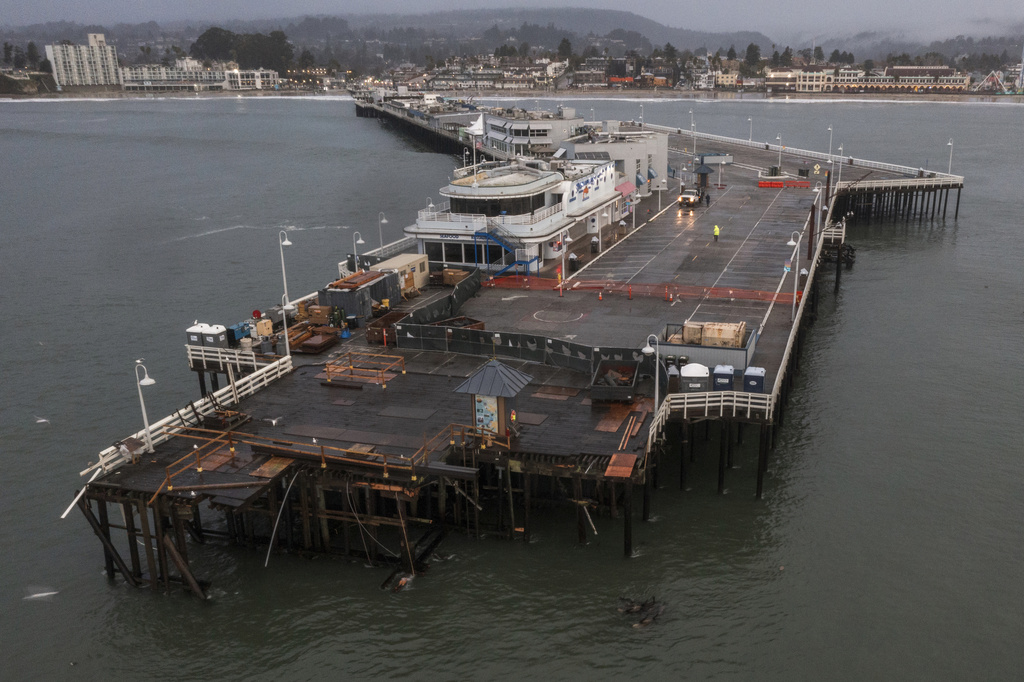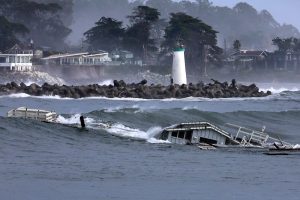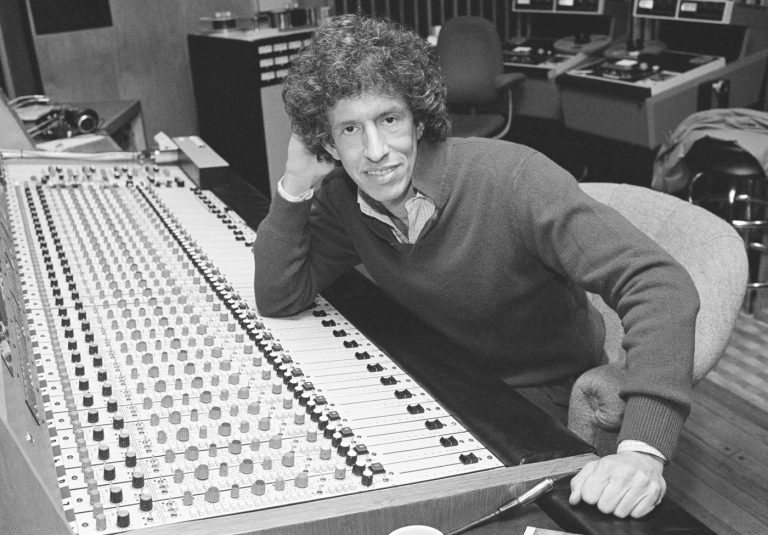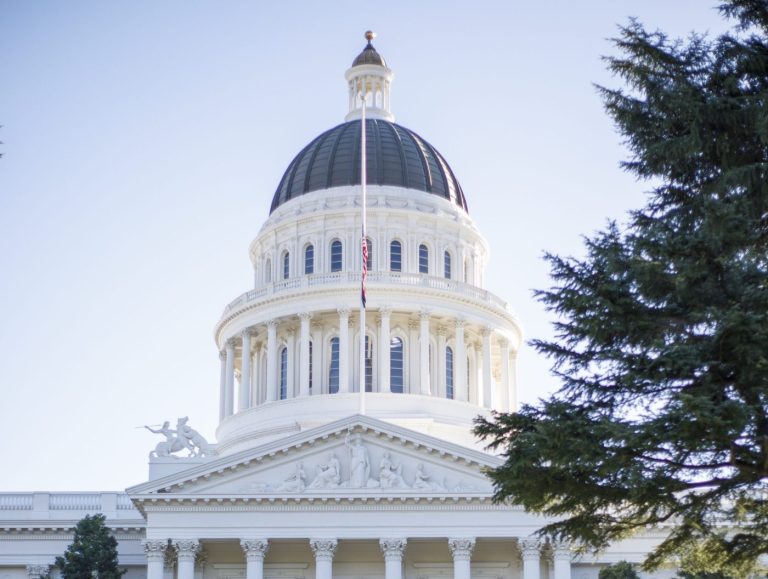SANTA CRUZ — Engineers continued to assess the structural integrity of the Santa Cruz Wharf on Tuesday, a day after white-capped waves ripped a section of the 110-year-old wharf into Monterey Bay.
Santa Cruz officials gave no timeline for the reopening of the city landmark or any of the restaurants located on it, citing turbulent surf that continued to pound one of the longest wooden wharfs on the West Coast. All the while, pieces of the wharf — as well as the restrooms that once stood near its western end — continued to bob and slosh off the coast.
“There are many, many, multiple dynamic layers as to what’s being assessed, from beaches to the wharf structure itself,” said Mike Godsey, superintendent of the city’s parks and recreation department, while adding that “public safety is obviously the key goal.”
“Most likely, that will be a long process,” he added. “Time will tell.”
A Santa Cruz Municipal Wharf restroom continues to be battered by waves Monday afternoon as it is carried toward Seabright State Beach. (Shmuel Thaler – Santa Cruz Sentinel)
The collapse added to a long history of ocean waves beating back and outright destroying landmarks along the Monterey Bay coastline known for its pristine beauty. It also brought fresh peril to restaurants and small businesses lining the popular Santa Cruz attraction, with restaurants forced to unexpectedly — and indefinitely — close during the holiday season.
“Commercially, it’s going to be a major impact,” said Duf Fischer, a past president and consultant for the Santa Cruz Area Chamber of Commerce.
The collapse happened around 12:45 p.m. Monday, when about 150 feet of the wharf tore off into the bay as powerful swells barraged the structure. A public restroom and a section of the wharf that once held The Dolphin Restaurant broke off and began floating nearby.
The area had been closed for repairs and construction due to damage caused by a storm in December 2023. As a result, crews had already demolished The Dolphin Restaurant, which was built in the 1960s, to make room to fix missing and damaged pilings. The construction was tentatively slated to be completed in March 2025.
Three workers inspecting the wharf fell into the choppy ocean waves as the end of the wharf broke in two. Two of them were rescued by lifeguards, while the third person managed to swim to safety, officials said.
The collapse took people dining and sightseeing by surprise Monday — forcing them to flee while rescuers took to the water to rescue the construction workers who fell in. Cody Wright, 29, of Folsom, recalled the lights flickering inside Stagnaro Bros., while visiting his former coworkers insight the decades-old eatery. That’s when they all raced outside.
“I looked down and there’s a bobcat excavator in the ocean,” Wright said. He watched with awe as the bathroom that had once been on the wharf floated to the mouth of the San Lorenzo River. The sight was particularly astonishing, given how he had seen stronger storms slam into the wharf — including one last year that left the fish tank inside Stagnaro Bros. sloshing water “like a bathtub.”
“I guess the waves hit it just right,” he said of the wharf’s collapse.
High tide waves hit the wharf in Capitola, Calif., Thursday, Dec. 28, 2023, where repairs for last year’s devastating storms are still underway. (Karl Mondon/Bay Area News Group)
The incident bought back memories of the nearby Capitola Wharf collapse during a series of storms in January 2023. Officials have since spent $7 million repairing it — work that appeared to fare well during Monday’s swells. No damage had occurred as of Tuesday morning, Capitola City Manager Jamie Goldstein. But that wharf remained closed as floating debris from the Santa Cruz Wharf pounded against it.
The destructive waves appeared to be the result of two massive low-pressure systems churning in the Pacific Ocean, both of which had stalled of late while creating howling winds in excess of 60 mph that churned up ocean waves across thousands of miles, Golden Gate Weather Services meteorologist Jan Null said. With nothing to push those low pressure systems out of the ocean, the winds built ocean swells that peaked every 20-to-26 seconds off the central Californian coast on Monday. Normal, such swells are registered every 10 seconds, Null said.
For many, Monday’s collapse was nothing less than “shocking.”
Opened in 1914, the Santa Cruz structure became the West Coast’s longest wooden wharf out of necessity, given Monterey Bay’s shallow waters near the Santa Cruz shoreline, said Ross Gibson, 69, historian for the Santa Cruz Sentinel. A rail line was built on the wharf as well, and it became a central dock for steam ships to anchor and unload cargo and passengers.
After World War II, the wharf transformed into a tourist and dining attraction, as well as a hub for fishermen.
“It’s a Main Street in the middle of the ocean — a place where we enjoy our interaction with the Monterey Bay,” Gibson said.
“For many years it was the center of the Italian fishing community, which came little by little after Cottardo Stagnaro jumped ship as a cabin boy and discovered how much he loved this place,” Gibson added, referencing the patriarch whose family went on to open and operate Stagnaro Bros. “For the whole community, it’s a big loss, because we don’t know how long these restaurants are going to be able to sustain themselves.”
Even so, Null warned tourists and beachgoers to avoid the coast over the next several days, given the likelihood for continued ocean swells and sneaker waves.
“The pattern isn’t really changing,” Null said. “Stay away from the water. Figure out how far you want to be, and be twice that distance back from the water.”
Reporters Paul Rogers and Caelyn Pender contributed to this report.












